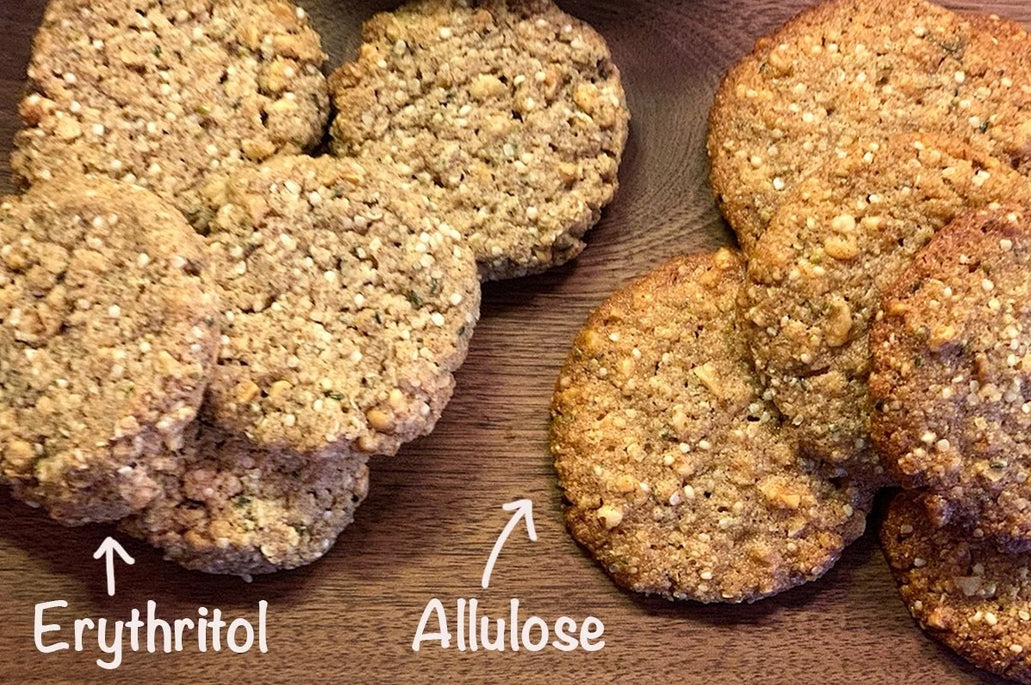
Allulose vs Erythritol: The Healthier Choice
Share
Allulose is the better choice, so we came up with Keto Goods’ Allulose sweetener. You can use this zero-calorie sugar substitute anyplace you would use regular sugar for anything from sweetening beverages to baking.
People choose to use sugar substitutes over natural sugar for many reasons. Whether you have diabetes trying to keep blood sugar levels under control, someone who is dieting, or just trying to curb your sugar intake, there are sugar alternatives to fit your needs.
How do you choose between all of the options out there?
Let’s dive into two common sugar-free substitutes: allulose and erythritol.
What is the Difference Between Erythritol and Allulose?
Erythritol and allulose are both sugar substitutes that are used as alternatives to traditional sugar (sucrose). The primary difference is that erythritol is a polyol, and allulose is a monosaccharide sugar. Erythritol is also a sugar alcohol, whereas allulose is not.
The choice between them often depends on personal taste preferences and the specific culinary or dietary requirements of a recipe. Some individuals may prefer allulose for its closer resemblance to sugar, while others may choose erythritol for its cooling effect and ease of use in recipes.
Is Erythritol Natural?
Although erythritol is found in nature in some fruits, mushrooms, and fermented foods, it is only found in very, very small amounts. Because of this, the erythritol you purchase in the store is not produced by natural sources.
Since it is found in nature, the Food and Drug Administration (FDA) does consider it a natural sugar, albeit a synthetic version of the natural sweetener.
Is Allulose Natural?
Yes, allulose is considered a natural sugar. It is a naturally occurring sugar that is found in small quantities in certain foods, including wheat, figs, and raisins.
While allulose occurs naturally, it can also be produced commercially through enzymatic conversion of fructose, often sourced from corn. This commercial production process allows for a more readily available supply of allulose for use as a sugar substitute in various food products.
Which is Sweeter: Allulose or Erythritol?
Allulose is generally considered to be sweeter than erythritol. Allulose is about 70% as sweet as table sugar. Erythritol is closer to 60% as sweet as table sugar.
Allulose is reputed to have less of an aftertaste than erythritol. However, neither product has that bitter aftertaste that some artificial sweeteners have.
Are There Health Benefits to Allulose and Erythritol?
The FDA generally recognizes these sugar substitutes as safe (GRAS). They offer customers a sweet taste without the calories, carbs, or negative impact on insulin levels.
Neither product causes an increase in the person’s blood glucose, which is something diabetic people look for in sweet products.
Research has shown that allulose decreases plasma insulin, which can be a big positive. The glycemic index is negligible.
Neither product leads to tooth decay. Both can help combat obesity when used in one’s diet.
Any Disadvantages to Allulose and Erythritol?
Most sugar substitutes can cause some gastrointestinal distress if used in large amounts. Adverse side effects can include bloating, diarrhea, and nausea. When used in small quantities, there is less chance of experiencing these undesirable effects.
Allulose has fewer documented side effects than its counterparts, making it a top runner for consumers.
Is Allulose Keto-Safe?
Allulose sweetener has a very low sugar and carbohydrate content, meaning allulose is keto-safe.
Allulose can take sweet treats such as cookies and ice cream and make them low-carb enough to be considered keto. It is important to remember that when eating keto, the net carbs matter.
So Can Allulose Be Used in Place of Erythritol?
Yes, in many cases, you can use allulose in place of erythritol as a sugar substitute in recipes. Both allulose and erythritol are low-calorie sweeteners that can be used to replace sugar in various culinary applications, including baking, cooking, and beverages
Is Allulose Sold in Europe?
Allulose has yet to be on the market in Europe. This can be misconstrued as meaning the product is unsafe, but that is not accurate.
The rules are just different on what needs to be done for a product to be sold there.
